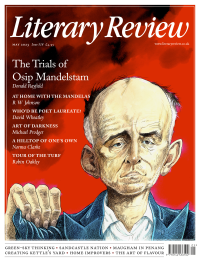Elizabeth Goldring
Pop Goes the Cockerel
Tudor Children
By Nicholas Orme
Yale University Press 288pp £20
This is the first general study of childhood in England in the period between 1485, when Henry VII came to the throne, and 1603, when Elizabeth I died. Nicholas Orme’s preface modestly describes Tudor Children as ‘an introduction to the subject rather than a final definitive history’, but it is difficult to imagine that this erudite and entertaining book will be surpassed anytime soon.
An expert on late medieval and early modern English social and religious history, Orme has an encyclopedic knowledge of the primary sources, coupled with an eye for a memorable anecdote. Manuals on pregnancy and childbirth become, in Orme’s hands, tools for illuminating a range of superstitions of the period, from the belief that ‘a mother being startled by a hare or having a desire to eat hare’ while pregnant would result in her child having a cleft palate (‘harelip’) to the idea that seventh-born sons possessed the power – shared only with the monarch – to cure scrofula (known also as the ‘king’s evil’) with their touch. Household inventories bring to life the fixtures and fittings of aristocratic nurseries, while schoolboy attempts to translate everyday English phrases into Latin enable Orme to eavesdrop on the vernacular of the Tudor playground. ‘Thou stinkest’, ‘I shall kill thee with thine own knife’ and ‘He is the veriest coward that ever pissed’ seem to have been common rejoinders. Visual sources are mined, too: funerary brasses and tomb sculptures for the insights they offer into Tudor parents’ experiences of grief and loss; painted portraits of family groups for what they reveal about the clothing and (ideal) deportment of boys and girls of all ages.
Tudor Children overturns many casual assumptions about life in the period. Child marriage, though a reality for some, was not the experience of most. Orme – who has combed through surviving parish records of baptisms and marriages – calculates that in around 1600 the mean age of marriage in

Sign Up to our newsletter
Receive free articles, highlights from the archive, news, details of prizes, and much more.@Lit_Review
Follow Literary Review on Twitter
Twitter Feed
Under its longest-serving editor, Graydon Carter, Vanity Fair was that rare thing – a New York society magazine that published serious journalism.
@PeterPeteryork looks at what Carter got right.
Peter York - Deluxe Editions
Peter York: Deluxe Editions - When the Going Was Good: An Editor’s Adventures During the Last Golden Age of Magazines by Graydon Carter
literaryreview.co.uk
Henry James returned to America in 1904 with three objectives: to see his brother William, to deliver a series of lectures on Balzac, and to gather material for a pair of books about modern America.
Peter Rose follows James out west.
Peter Rose - The Restless Analyst
Peter Rose: The Restless Analyst - Henry James Comes Home: Rediscovering America in the Gilded Age by Peter Brooks...
literaryreview.co.uk
Vladimir Putin served his apprenticeship in the KGB toward the end of the Cold War, a period during which Western societies were infiltrated by so-called 'illegals'.
Piers Brendon examines how the culture of Soviet spycraft shaped his thinking.
Piers Brendon - Tinker, Tailor, Sleeper, Troll
Piers Brendon: Tinker, Tailor, Sleeper, Troll - The Illegals: Russia’s Most Audacious Spies and the Plot to Infiltrate the West by Shaun Walker
literaryreview.co.uk